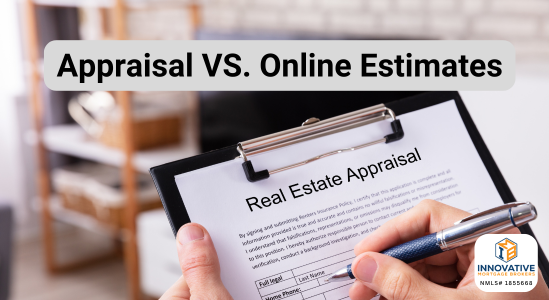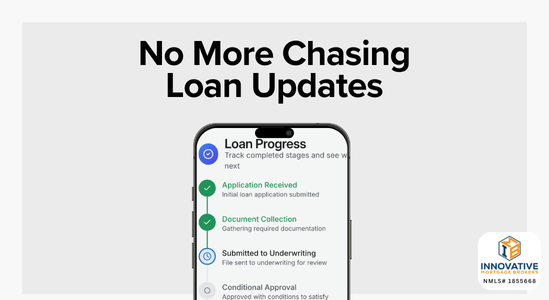Mortgage rate volatility, oil shocks, and why execution matters more than quotes When a war…
Why Your Appraisal Value May Differ from Online Estimates
Understanding the human touch that refines home valuations for real-world accuracy
If you’re like most homeowners or prospective buyers, you’ve probably looked up property values on Zillow or Redfin at one time or another. It’s quick, convenient, and provides a rough idea of what a home might be worth. But then you get a professional appraisal for your mortgage or refinancing process, and suddenly, the numbers don’t match. So, what’s going on?
In this article, we’ll look at why an appraiser’s valuation can differ significantly from those quick online estimates—and why that discrepancy isn’t all that surprising.
Online Estimates: Limited by the Data They Have
Automated Valuation Models (AVMs)
Sites like Zillow and Redfin use automated valuation models (AVMs), which rely heavily on publicly available data:
- Recent Sales: They look at nearby, similar properties that have sold in the last few months.
- Size & Location: They check square footage, lot size, and general neighborhood trends.
- Market Trends: AVMs often use local sales activity to make broad assumptions.
What They Miss
But here’s the catch: these sites have no idea what’s going on inside your home. Maybe you’ve poured money into a kitchen remodel, finished the basement, or installed solar panels. Algorithms simply don’t have the human eye (or a crystal ball) to gauge condition, upgrades, or certain quirks—like that damp, musty basement next door.
Appraisers: A Hands-On, Detailed Evaluation
A professional real estate appraiser does more than crunch numbers and feed them into a computer:
- On-Site Tour: They physically walk through the property, examining the home’s condition, finishes, and unique features.
- Comparable Sales (Comps): Appraisers pick recently sold homes with similar characteristics—but then they make adjustments based on actual property differences.
- Market Knowledge: They factor in neighborhood trends, location specifics (like proximity to shops or highways), and local economic conditions.
- Adjustments for Renovations: If you’ve upgraded your kitchen with high-end appliances or completely remodeled your bathroom, the appraiser will likely add value to account for those improvements.
By taking a personal, in-depth look at a house, an appraiser delivers a more customized value—something an automated system can’t replicate.
Appraisals Are Also Opinions of Value
It’s important to remember that an appraisal is still an opinion of value, albeit a highly educated one. Two different appraisers might assess the same property and come up with slightly different numbers. Why does that happen?
- Professional Judgment: Some appraisers may weigh recent renovations more heavily, or place more importance on certain neighborhood features.
- Choice of Comparables: Which homes they consider “most similar” can vary. One appraiser might prioritize a nearby home with a slightly different floor plan, while another might emphasize one with a remodel more like yours.
- Market Shifts: If the market is in flux (rising or falling quickly), an appraiser who visited earlier could produce a different value than one who comes a few weeks or months later.
These variations don’t mean one person is “wrong.” It just highlights that property valuation involves both art and science—a blend of data, experience, and professional judgment.
Condition Really Matters
One of the greatest factors that online estimates overlook is a property’s actual condition:
- Maintenance & Repairs: An older roof, outdated electrical systems, or visible damage can reduce value.
- Recent Updates: A new deck, high-quality landscaping, or an in-law suite might boost it.
If your house has been meticulously cared for (or if it’s had renovations that simply haven’t been updated in the public record), your home’s condition may be far better (or worse) than the AVMs realize. The appraiser’s first-hand inspection is a big reason their report can look drastically different from a website’s estimate.
When Online Estimates Are Useful
All that said, online estimates aren’t worthless; they just need to be kept in perspective:
- Starting Point: Online estimates can give you a ballpark figure—helpful if you’re just starting your home search or considering a refinance.
- Broad Comparisons: They can show you how your home stacks up against others in the area, providing a basic overview of local real estate trends.
But when it comes to truly nailing down a value—especially if you’re applying for a mortgage or considering a big financial move—a hands-on appraisal is the more accurate approach.
Final Thoughts
Zillow, Redfin, Realtor.com, and other online tools might be convenient for getting a quick gauge of a property’s value, but they simply can’t account for all the nuances that go into pricing a home. Condition, upgrades, and recent improvements can dramatically shift what a house is really worth, and only a professional appraiser who sets foot inside can accurately capture that.
Keep in mind, too, that even appraisers differ in their professional opinions. At its core, property valuation is both data-driven and somewhat subjective. So if you ever wonder why your appraisal isn’t lining up with what you saw online, now you know: those numbers reflect a thorough on-site evaluation, one that goes well beyond the reach of an automated algorithm.





